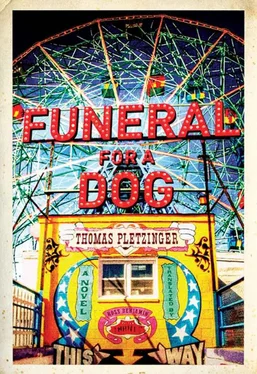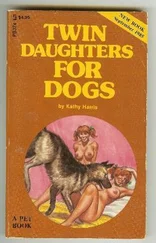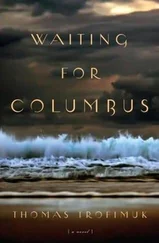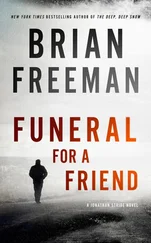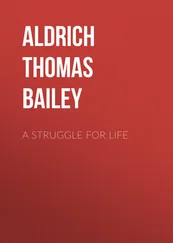The singing saw is singing again. There are more and more flags, Kiki interrupts me, and nods to the one-legged man, stars and stripes and rainbows, a time of fresh veterans and new one-legged people is approaching. Breakfast? she asks. Yes, I say, Lua too. When we step into the street from the lobby, the Bowery comes back to me. Right around the corner there are good Bloody Marys, I say, and take Kiki’s hand. It’s the first time I’ve touched her intentionally. Her hand in mine feels realer and warmer than expected. Only now do I notice her eyes. Stop right there! she says after two blocks and takes a picture of Lua and me in front of a construction fence covered with missing-person posters. Burned-out candles, Lua among dried roses and brownish lilies, missing! missing! missing! like an aureole around our heads. Behind the fence is the empty garden of the B Bar & Grill, this morning only a fat cat is sitting here under the tree and its turned-off strings of lights, the first leaves are falling. Lua lies down under the table and immediately falls asleep. Here too a television is on. Kiki orders coffee instead of Bloody Marys, as if we always ate breakfast together, and on television Mayor Giuliani is talking about how this city has to shop and live and have breakfast as if everything were completely normal, good morning, New York! Good morning!
Kiki pays and politely says thanks for Lua’s water. That was the last of my money, she says. Under a tree with Kiki, with the credit card in my suit pocket and a coffee in my hand, the world looks distinctly simpler, I think. But then, as Kiki puts her camera on the table and laughs, as she looks at me with interest, as Lua sleeps between our feet, I tell her about the cracked concrete slabs of the Williamsburg piers around noon on September twelfth, the two painters in the sunlight and their portable easels, the smoke over the East River bridges in their oil paints. Everywhere people were standing and staring and talking, the cloud was wafting southward from the World Trade Center, we could smell it. Tuuli sat on a plank, leaning back on her arms, stretching her pointy belly into the sun. I threw stones in the water. A boy with horn-rimmed glasses and a Pavement T-shirt sold Felix pieces of melon from a cooler bag. Cars stopped, photographers took their pictures, two camera crews searched for suitable perspectives, a journalist asked us one by one whether we knew anyone down there, at the site formerly known as the World Trade Center? He moved on without notes. The smoke smells like Seraverde, said Tuuli, throwing a melon rind into the river, like plastic, gasoline, fire, wet earth, and poverty. Lua jumped in after it. A photographer photographed him as he climbed out of the shallow water with the rind in his mouth and shook himself off, the column of smoke in the background.
Which must have been an interesting picture, Kiki Kaufman interrupts me. For two weeks now she’s been taking pictures of the garbage collection and the piles of black garbage bags on the sidewalks, pictures of the police at roadblocks, of the heaps of flowers in front of fire stations, of starved cats and parakeets in evacuated apartments south of Canal Street, of the moral-support crowds lining the West Side Highway toward the south, the USA! USA! USA! posters, of bars and cafés and restaurants between Lafayette Street and the Bowery, of drunk people, of crying people, of the bakers in Brooklyn and of American flags in American windows, cars, and trains. Those seconds of this city, says Kiki, have not vanished as irretrievably as others before and after. On the morning of September twelfth, she set out toward New York from Chicago. After the long drive through Illinois, Indiana, Ohio, Pennsylvania, and New Jersey, she parked on the other side of the Hudson. As the only passenger heading toward Manhattan she made it on board an evacuation ship only after long discussion. She was inspected several times by police officers and private security services and finally made it through back alleys and restaurants into the restricted area south of Fourteenth Street, into the completely deserted “frozen zone.” The city found itself in a sort of war, but she simply strolled through bars and between garden chairs. She had come too late and was only able to photograph the consequences, not the causes, but those ultimately couldn’t be photographed anyway without a world journey. That was the first displacement of reality. She shot the cameras and camera vans and cameramen, who themselves filmed and photographed ruins and debris and dust, she took pictures of the cameras at Ground Zero, pictures of a German photographer in Brooklyn, an Italian camera crew in lower Manhattan, of French tourists with digital cameras, photojournalists with reflex cameras, children with disposable cameras and artists with Hasselblads. Kiki scratches Lua behind the ears and says that we should hit the road now. I want to show you something, she says, pulling Lua across the courtyard and out into the street, the two of them speak English with each other and walk side by side as if they’ve known each other for years. As we pass David’s Kosher & Halal Meat on the way to Kiki’s car, we buy Lua his breakfast. Kiki clears off the backseat of her green Honda, she puts three shoeboxes full of pictures in the trunk, takes out a blanket, and makes Lua a bed in the back. She gives me a bottle of water, I haven’t drunk water for days, and as Manhattan gradually disappears in the rearview mirror, I unwrap Lua’s first proper meal in days from the wax paper.
Along the way I tell her about Miguel and John and their duplex apartment overlooking Tompkins Square Park. John modeled for Tom Ford and Miguel was his agent. Miguel had invited us, so Tuuli, Felix, and I walked across the Williamsburg Bridge in the late afternoon. Tuuli was breathing heavily, and even Lua had a certain wariness in his dragging gait. Manhattan was quiet, the bridge spanned the river without cars on it. We sat down in front of Miguel’s gigantic television, John was wearing a blue T-shirt with the red inscription Super-Gay , from the window we could see the smoke cloud hanging in the cold white light of Ground Zero. Everybody, this is Super-Gay, said Miguel, Super-Gay, this is everybody. The television was muted, in a glass display case were a few bottles of Bombay Sapphire, CNN flickered in our faces. The airplane loops had been dropped from the program, instead there were now images of the clean-up operation, the posters along the highways and green America Under Attack logos. Mayor Giuliani spoke in front of the first homemade missing-person posters on a lamppost. I already can’t watch this shit anymore, said Miguel, America the Beautiful, Bush is hiding somewhere in the clouds over America and suddenly Zero Tolerance Giuliani is the city’s savior, God bless New York, one nation under God, and Rudy will take care of everything, probably he’ll want to be president soon. Miguel took his telephone from the table and pointed to the smoke, God bless America! Tuuli sat on the sofa and drank water, she rolled Felix a cigarette, occasionally she stood up and arched her back and stuck out her belly. On the terrace Miguel talked on the phone and gesticulated in a purple satin bathrobe, I heard Bach’s Goldberg Variations from the living room and slowly got drunk again. Miguel yelled something Italian into his phone, took a running start, and slid on his Asian slippers across the marble or fake marble. I wanted to get up and climb down from the roof terrace, walk along Avenue B holding Tuuli’s hand, go through one or two police checkpoints and get into a taxi to the airport. Lua could have stayed with Felix. They would let a pregnant woman through everywhere, Tuuli could have slept awhile at the airport, then we would have drunk Earl Grey and eaten oranges for breakfast. In an advanced stage of pregnancy she would have gotten special treatment and been put on the first flight out and back to Europe. In Helsinki or Berlin we would have already had to wear winter jackets, the child could have been born in the Charité. I could have been the official father. But I remained seated and drank, Tuuli closed her eyes, the moon stared over the rooftops, and eventually Felix poured his beer into Lua’s bowl and we switched to gin.
Читать дальше
